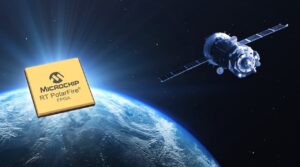Spaceflight system developers typically undertake design with new components only after they have received MIL-STD-883 Class B qualification and are in the process of meeting the Class Q and Class V standards of the Qualified Manufacturers List (QML) for reliability of spaceflight components.
 Microchip Technology has now achieved the first qualification milestone with its PolarFire RT FPGA, enabling designers to begin assembling spaceflight systems that take advantage of this FPGA's computing and connectivity throughput and its lower power consumption and immunity to Single Event Upsets (SEUs) configuration. compared to SRAM. FPGAs.
Microchip Technology has now achieved the first qualification milestone with its PolarFire RT FPGA, enabling designers to begin assembling spaceflight systems that take advantage of this FPGA's computing and connectivity throughput and its lower power consumption and immunity to Single Event Upsets (SEUs) configuration. compared to SRAM. FPGAs.
“Microchip is a QML-certified manufacturer of high-reliability FPGAs for space applications and has achieved the highest Class V qualification available multiple times on FPGAs and other integrated circuits,” said Shakeel Peera, vice president of marketing for the FPGA business unit. from Microchip. “This MIL-STD-883 Class B qualification is another major step toward solving some of spaceflight's toughest system challenges, including reducing satellite signal processing congestion with much lower power consumption and greater reliability than is possible using alternative FPGA solutions.
Peera added: “We have begun the final stage of qualifying our PolarFire RT FPGAs for QML Class Q and Class V requirements.”
To achieve MIL-STD-883 Class B qualification, PolarFire RT FPGAs have undergone a series of environmental tests to determine resistance to the harmful effects of natural elements, defense and space operations conditions, and mechanical and electrical testing.
Passing these tests paves the way for QML Class Q and V qualification while demonstrating the reliability advantages of PolarFire RT FPGAs in space. Their built-in configuration switches have been shown to be robust to more than 100 krad of total ionizing dose radiation exposure, making them suitable for most Earth-orbiting satellites and many deep space missions.
Unlike alternative solutions, these FPGAs do not introduce any configuration disturbances in radiation and therefore do not require mitigation, reducing engineering expenses and bill of materials costs.
The PolarFire RT FPGA family
The RT PolarFire FPGA family brings Microchip's 60 years of spaceflight heritage to a product line that delivers the computing throughput and connectivity needed for modern space missions. These FPGAs consume up to 50% less power than SRAM-based alternatives while enabling in-orbit data processing systems to meet demanding performance and reliable operation requirements without excessive heat generation in the harsh radiation environment of space. .
Its unique combination of Logic Elements (LEs), embedded SRAM, DSP blocks, and 12.7 Gbps transceiver lanes enables higher resolution for passive and active imaging, more channels and finer channel resolution for multispectral and hyperspectral imaging, and scientific results more accurate. measurements using noisy data from remote sources.
PolarFire RT FPGAs can also be paired with one or more complementary Microchip solutions in today's spaceflight systems, including its VSC8541RT Ethernet PHY, CAN PHYs USB to UART interface, clocks and oscillators from the company's Clock and Timing Solutions Group and Solutions power from your analog power and interface group.

